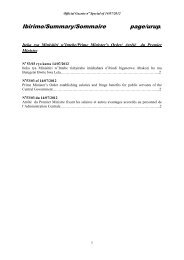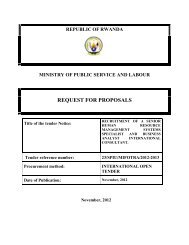MINALOC - Mifotra
MINALOC - Mifotra
MINALOC - Mifotra
Create successful ePaper yourself
Turn your PDF publications into a flip-book with our unique Google optimized e-Paper software.
<strong>MINALOC</strong>, Functional Review draft, 31 March 2008<br />
Imihigo District 21, Five Year Plan (DIP), <strong>MINALOC</strong> Sector Planning, Integrated Development<br />
Programme 22, Monitoring and Evaluation Programme, etc. These specialised interventions in planning<br />
take up the entire year and pushes routine annual planning into second place.<br />
Monitoring. As each agent has activities to achieve, he/she also has reports to submit to the Manager.<br />
To this end, <strong>MINALOC</strong> has adopted a system of weekly, monthly, quarterly and annual reporting. As<br />
currently agreed, these different reports should be written by each professional ready to transmit them to<br />
his/her Director or to the person designated to receive the reports in lieu of the Director. The Director<br />
then consolidates these reports into a single document which is then itself passed onto the person<br />
responsible for planning. This person consolidates the reports of all of the units and transmits them to<br />
the Secretary General. The exception is quarterly reports for which the person responsible for planning<br />
also prepares a letter to accompany these reports, which will be transmitted to the Prime Minister.<br />
The written monitoring reports at <strong>MINALOC</strong> are daily, weekly, monthly, quarterly and annual. Daily<br />
agendas are produced by all personnel using the framework designed by the Director to ensure all are<br />
collected and sent onto the hierarchical superior and to the Secretary General. Weekly and monthly<br />
reports are written by unit directors and transmitted to the SG. These reports are not based on a system<br />
of which would allow the comparison of what was planned and what was achieved.<br />
The system of weekly and monthly reporting can be improved. The daily reporting, as it is used at the<br />
moment, centralised to the level of SG needs to be abandoned because it is inefficient.<br />
Weekly SG meeting. The various regular meetings do not have specific names, and none have regulatory<br />
frameworks. At an unidentified time in the past it was normal to have a weekly meeting in which the<br />
Minister and the SG participated.<br />
Now it is the SG who directs weekly meetings in which only the directors participate. But these meetings<br />
are often put back to another day or week when there are more urgent activities to carry out.<br />
Weekly meeting by unit: According to internal preferences, it has been recommended by the Minister<br />
that each unit should hold a weekly meeting prior to that of the SG. These meetings have become<br />
irregular, even impossible to hold for some units.<br />
Monthly Management meeting: Once a month on the first Monday of each month, the Minister holds<br />
a meeting with all personnel. Before the meeting a report must be circulated which gives the results of the<br />
previous month and the planning for the month to come. These meetings take place regularly but focus<br />
more on the discussion than the written reports provided by each operational unit.<br />
Daily report: There is a table which is used as a model for the daily report. This table includes the<br />
objective of the unit, the activities planned in the day, the results planned for the day, the person<br />
will benefit from water, electricity, schools, health centers etc. to achieve the Millennium Development Goals<br />
(MDG). For more information, see “Republic of Rwanda, Capacity Development and Building a Capable State, Rwanda<br />
Country Report, Kigali, August 2007”<br />
21 Imihigo are considered to be founded on the results and performance of responsible governance. Imihigo is a<br />
performance contract containing the development objectives for the District over the given period. These objectives<br />
are based on the development priorities identified by the population themselves, through various levels of<br />
consultation of the Local Government. The contracts are signed between the President of the Republic and the<br />
Districts Mayors, who have to report regularly to the President and to the population on the progress achieved in the<br />
implementation of these contracts. This has enormously improved the participation of the population in their own<br />
development and has meant that the concept of management based on results has been reinforced. It is also<br />
considered to be an efficient mechanism of monitoring and evaluation of development activities. .<br />
22 Meetings between the key sector Ministries exist and include MINAGRI, MINITERE, and MININFRA to<br />
ensure that planning in all key Ministries is aligned. In these meetings, each Ministry explains what it plans to achieve.<br />
The result of this process is the development of projects.<br />
44


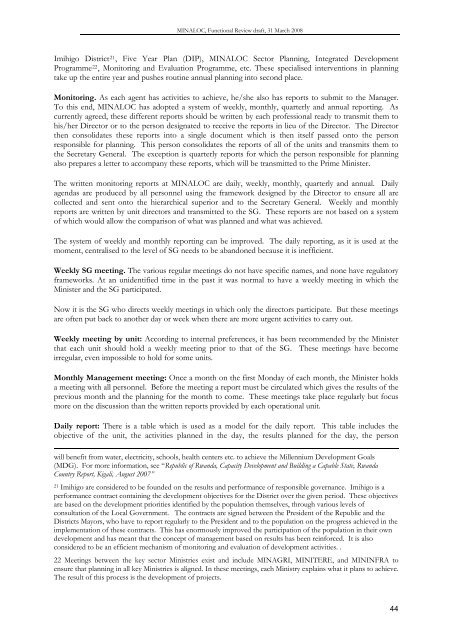

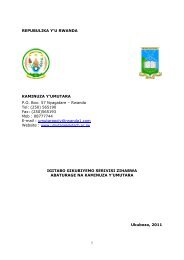
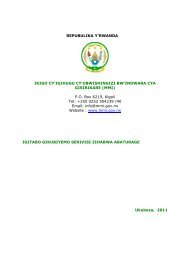
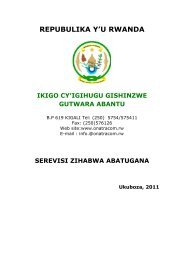
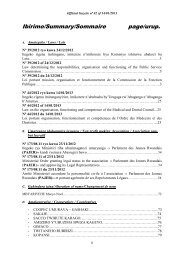
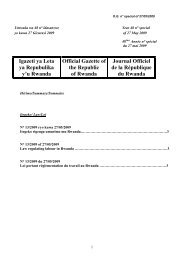
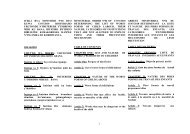
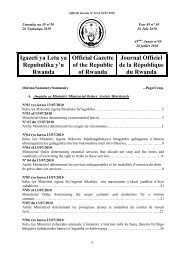
![Official Gazette n°27 of 05[1]. - Mifotra](https://img.yumpu.com/10476421/1/184x260/official-gazette-n27-of-051-mifotra.jpg?quality=85)
